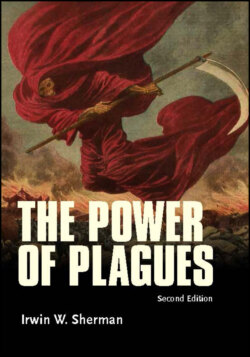Читать книгу The Power of Plagues - Irwin W. Sherman - Страница 29
Plagues and the Rise of Christianity
ОглавлениеPlagues of various sorts were not unfamiliar in Roman history. An epidemic—probably smallpox—struck the city in A.D. 65. It was brought, or so we believe, by Roman troops who had been campaigning in Mesopotamia. Mortality was heavy, and in some cases half the population died. A new round of smallpox infections began in A.D. 251 to 266, and it was reported that 5,000 a day died at its height. By this time measles may also have become established among Mediterranean populations. No accurate estimates of population losses can be given, but they must have been high.
The early Romans owed their loyalty to their pagan gods. Their religion was one of form and ritual rather than of spiritual observance. In essence, the Romans had a contractual relationship with their gods: if you do something for me, I will do something for you. At first their religion was animism: gods represented the spirits in water, rocks, fire, trees, beasts, sun, moon, stars, and lightning. The spirits were amoral, and they either helped or harmed the worshippers according to the manner in which they were treated. In effect, the role of religion was the appeasement of the multitude of gods so that the worshippers would receive some kind of benefit. From the Etruscans the Romans borrowed elaborate religious ceremonies and gods with a human form, a form that could be represented as painted images or carved statues. And it was the Etruscans who gave the Romans their earliest contact with the gods and goddesses of Greece, many of whom were absorbed into the Roman religion. Cults developed to worship specific gods at specific times (called holy days or, later, holidays), and those who presided over the cult rituals were called priests, but these individuals were neither moral nor spiritual. In time the emperor himself became a god, and so loyalty had to be sworn to him.
Then, in the 1st century A.D., there appeared a new kind of religion, preached by Jesus of Nazareth (the Christ) and his disciples. Although Jesus preached for less than 3 years in what is now Palestine, his many disciples traveled throughout the Roman Empire spreading the word of the Christian religion. Jesus’ preaching took the form of parables and miraculous healings; he encouraged the poor and the oppressed, spoke of forgiveness, and proselytized that there should be detachment from wealth and property and that the outcasts and sick of society should be given special care. Because the Roman Empire consisted of many cities, Christianity became an urban movement. (Indeed, because of this, those living outside the city were called rustic or, in Latin, paganus, from which the word “pagan,” meaning non-Christian, is derived.) Jesus gathered around him a community of followers who regarded themselves as God’s people, and they went forth establishing a missionary movement. The early Christians had a moral ideal: they separated themselves from pagan idolatry and they espoused universal salvation. Because Jesus’ disciples preached the coming of a new king, it appeared to the Romans that there might be a revolution in the making. But at the outset the Romans simply regarded Jesus as a minor political rebel whose followers could be used as convenient scapegoats. As a result, the Christians were blamed for all types of disasters, including plagues, inflation, fires, and even barbarian incursions. The reasons for this were many: the Christians did not worship the emperor, they did not observe the pagan ritual acts, they insisted that they alone possessed God’s truth, and Christ’s teachings were critical of the established order. Christ’s omnipotence was also believed to be demonstrable by those who had survived a debilitating or deadly disease.
The rise and consolidation of Christianity may have also been affected by disease. The expectations of the poor Romans were that with Christ’s second coming they would be freed from their rich masters. Christianity, unlike paganism, preached care of the sick as a recognized religious duty. Those who were nursed back to health felt gratitude and commitment to the faith, and this served to strengthen Christian churches at a time when other institutions were failing. Another positive feature of Christianity was that the teaching of the faith made life meaningful even in the face of sudden death since it was perceived as a release from an individual’s suffering. The capacity of Christian doctrine to cope with the psychic shock of epidemic disease made it attractive for the populations of the Roman Empire. Paganism, on the other hand, was less effective in dealing with the randomness of death. In time the Romans came to accept the Christian view. Rome became the headquarters of Christianity, and in A.D. 337, with the conversion of Emperor Constantine, Christianity became the church of the empire.
